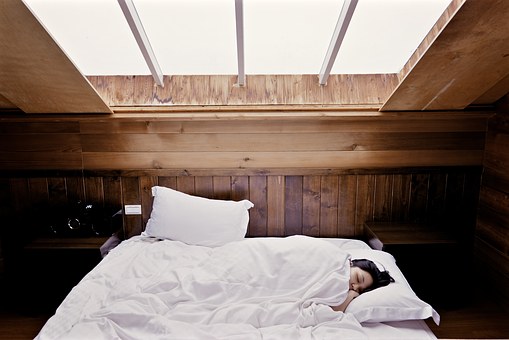 “If you can’t sleep, then get up and do something instead of lying there and worrying. It’s the worry that gets you, not the loss of sleep.” – Dale Carnegie, American writer and lecturer
“If you can’t sleep, then get up and do something instead of lying there and worrying. It’s the worry that gets you, not the loss of sleep.” – Dale Carnegie, American writer and lecturer
***
If you are constantly checking your Facebook on your phone or browser, then there’s one thing you need to know: You’re not getting enough sleep, according to a recent research done at the University of California.
Professor Gloria Mark, who led the study, asked students to fill out a sleep survey; activity was monitored on their phones and computers – logging when they switched from one window to another, texted or made a phone call.
“There have been lots of studies on how information technology affects sleep,” Prof. Mark was quoted in an article published by “The Independent.” “We did the opposite: We looked at how sleep duration influences IT usage.”
According to the study, there’s a connection between lack of sleep, low mood and incessant checking of social media. The study also found that the lesser the sleep, the most likely a person switches between screens and windows.
“When you get less sleep, you’re more prone to distraction,” Prof. Mark pointed out. “If you’re being distracted, what do you do? You go on Facebook. It’s lightweight, it’s easy and you’re tired.”
This brings us to the holy grail of questions that’s as old as time itself: “How much sleep does a person really need?”
Magic number
Most people contend that the magic number for a decent night’s sleep is 8 hours. But is this for all people, old and young alike?
Dr. Jerome Siegel, who studies sleep at the University of California at Los Angeles, told “New Scientist” that the 8-hour rule has no basis at all. His study of tribal cultures with no access to electricity showed that people get just 6 or 7 hours of sleep.
“And those people are pretty healthy,” Dr. Jerk Jan Dijk of the University of Surrey at United Kingdom added.
Most sleep experts, however, claim the amount of sleep a person needs varies on many factors, one of which is age. In an interview with “The Independent” Dr. Ana Noia, a senior clinical physiologist in neurophysiology and sleep at Bupa Cromwell Hospital, explained that sleep needs can vary according to the individual but as a standard rule, the sleep needs changes with age.
Here’s what Dr. Noia disclosed:
• Newborns need 16-18 hours a day.
• Two-year-old toddlers typically need on average 11-13 hours.
• By the age of five, children will sleep between 10-12 hours.
• Teenagers definitely don’t need sleep enough and should be getting eight to 10 hours.
• From the age of 20 onwards, it is normal to sleep seven to nine hours.
• Once you’re older than 65, the amount of sleep you need actually decreases, to around five to seven hours.
Dr. Noia, however, recommends that adult people – those more than 60 years old – sleep between seven to eight hours a night.
In the article, written by Olivia Blair, Dr. Noia said that the need to rest the eyes for different amounts of time depending on a person’s age comes down to complex changes in how the brain develops, the circadian rhythm, environmental factors, work and social needs and demands.
Further explanation from Dr. Noia: “For instance, the vast amount of sleep children require is because the hormone melatonin, which helps us sleep, reaches its peak at around seven or eight years old. This begins decreasing during the mid-teen years until the age of 70 when it is essentially non-existent in our bodies, meaning the need for sleep decreases. Additionally, elderly people are likely to find their quality of sleep is worse than when they were younger because sleep becomes more fragmented.”
Sleep deprivation
Are you getting enough sleep? “The best way to figure out if you’re meeting your sleep needs is to evaluate how you feel as you about your day,” the US National Sleep Foundation (NSF) says. “If you’re logging enough sleep hours, you’ll feel energetic and alert all day long, from the moment you wake up until your regular bedtime.”
Now, if you’re not getting enough sleep – as required – chances are you’re sleep deprived. Sleep deprivation is just more than falling face first into your dinner plate. It can be sleeping when you’re in a boring meeting or struggling through the afternoon slump.
The book, “Your Guide to Healthy Sleep,” enumerates the following signs of sleep deprivation: need an alarm clock in order to wake up on time, have a hard time getting out of bed in the morning, feel sluggish in the afternoon, get sleepy in meetings and lectures, get drowsy after heavy meals or when driving, need to nap to get through the day, fall asleep while watching television or relaxing in the evening, feel the need to sleep in on weekends, and fall asleep within five minutes of going to bed.
Here’s a very interesting fact: In Great Britain, it was found that six out of 10 people are sleep deprived, partly because of the advent of smart phones. Is it the same in the Philippines – or even worse!
Why sleep?
At one time, a kid asked: “Why do we need to sleep? We can’t we wake up all the time?” Good questions. The thing is: “Sleep is a vital indicator of overall health and well-being,” the NSF points out. “We spend up to one-third of our lives asleep, and the overall state of our ‘sleep health’ remains an essential question throughout our lifespan.”
The Healthy Sleep book gives some points on why sleep is very important: “The quality of sleep directly affects your mental and physical health and the quality of your waking life, including your productivity, emotional, balance, brain and heart health, immune system, creativity, vitality, and even your weight. No other activity delivers so many benefits with so little effort!
“Sleep isn’t merely a time when your body shuts off. While you rest, your brain stays busy, overseeing biological maintenance that keeps your body running in top condition, preparing you for the day ahead. Without enough hours of restorative sleep, you won’t be able to work, learn, create, and communicate at a level even close to your true potential. Regularly skimp on ‘service’ and you’re headed for a major mental and physical breakdown.”
Because sleep is very important, there are those who suffers from insomnia – having difficulty of falling asleep – doing “creative” ways to have a good night’s sleep. To German actress Marlene Dietrich, the only thing that can lull her to sleep was a sardine-and-onion sandwich on rye.
That’s according to the 90’s edition of “The Book of Lists.’ Here are more: French author Alexander Dumas was advised by his doctor to get out of bed when he couldn’t sleep. So, he started to take late-night strolls and eventually started to sleep through the night.
To cure his insomnia, American president Theodore Roosevelt drank cognac in a glass of milk. Whenever she stayed in a hotel, American poet Amy Lowell would rent five rooms – one to sleep in, and empty rooms above, below, and on either side – in order to guarantee quiet.
Myths and facts
Despite what science has discovered, there are still myths floating around. A few don’t believe them but a lot still accept them as the plain truth. Here are some of those myths, according to the US National Institute of Health:
Myth: Getting just one hour less sleep per night won’t affect your daytime functioning.
Fact: You may not be noticeably sleepy during the day, but losing even one hour of sleep can affect your ability to think properly and respond quickly. It also compromises your cardiovascular health, energy balance, and ability to fight infections.
Myth: Your body adjusts quickly to different sleep schedules.
Fact: Most people can reset their biological clock, but only by appropriately timed cues – and even then, by one or two hours per day at best. Consequently, it can take more than a week to adjust after traveling across several time zones or switching to the night shift.
Myth: Extra sleep at night can cure you of problems with excessive daytime fatigue.
Fact: The quantity of sleep you get is important, sure, but it’s the quality of your sleep that you really have to pay attention to. Some people sleep eight or nine hours a night but don’t need feel well rested when they wake up because the quality of their sleep is poor.
Myth: You can wake up for lost sleep during the week by sleeping more on the weekends.
Fact: Although this sleeping pattern will help relieve part of sleep debt, it will not completely make up for the lack of sleep. Furthermore, sleeping later on the weekends can affect your sleep-wake cycle so that it is much harder to go to sleep at the right time on Sunday nights and get up early on Monday mornings.
American journalist Patrick Allan highlights the importance of sleep when he wrote: “Getting a good night’s rest isn’t always as easy as it feels like it should be, but it can be very important for your health, so make sure you’re getting the sleep you need.”






